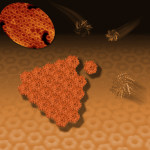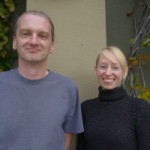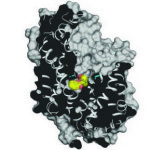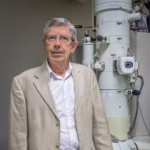Scientists for the first time have viewed how bacterial proteins self-assemble into thin sheets and begin to form the walls of the outer shell for nano-sized polyhedral compartments that function as specialized factories. Researchers in the Molecular Biophysics & Integrated Bioimaging Division determined the 3-D structure of the basic building block protein from crystallized samples in the Berkeley Center for Structural Biology at the Advanced Light Source. Their findings may eventually help improve drug delivery systems. Read more in the Berkeley Lab News Center.
Lab-Developed Beamline Tool Licensed
A diode beamstop technology for real time X-ray beam intensity measurement, developed by Diane Bryant and Simon Morton at the Berkeley Center for Structural Biology, was licensed to MiTeGen, which will commercialize a product to enhance X-ray beamlines used for pharma, materials, and biotech research. The Innovation and Partnerships Office managed the licensing process. Read more at IPO.
BCSB Helps Shed Light on Why Brain Responds to Dopamine and Serotonin
Scientists working at the Berkeley Center for Structural Biology in the Advanced Light Source (ALS) recently solved the crystallographic structures of several amine transporters in an effort to better understand why the human brain responds to chemicals like dopamine and serotonin. Their findings will help design drugs to treat neurological diseases and may also lead to a better understanding of how drug addiction can be managed. The work was led by HHMI Investigator Eric Gouaux of the Oregon Health & Science University. Read the ALS Science Highlight.
Could Revolutionary Gene-Editing Technology End Cancer?
Jennifer Doudna, faculty biochemist in Molecular Biophysics & Integrated Bioimaging, and her work on the CRISPR/Cas 9 gene editing system, have been highlighted recently in both The New Yorker Magazine and on CBS This Morning. The coverage discusses the benefits and perils of this technology, which is the topic of an international meeting being held currently at the National Academy of Sciences in Washington, DC.
Downing, with Dahmen and Denes, Wins Lab Lifetime Achievement Award
Ken Downing of the Molecular Biophysics & Integrated Bioimaging Division is a recipient of the 2015 Berkeley Lab Prize − Lifetime Achievement Award for his scientific advances and leadership in making Berkeley Lab among the world’s forefront centers for electron microscopy. Downing, who received the award together with Uli Dahmen and Peter Denes, has been … Read more »
- « Previous Page
- 1
- …
- 73
- 74
- 75
- 76
- 77
- 78
- Next Page »
Was this page useful?








